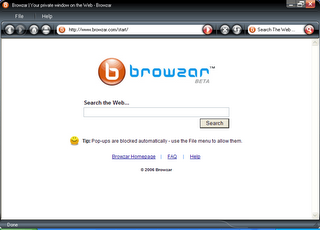Since I was in the download and test mood, I visited the Browzar site and downloaded the free web browser. It requires no installation. I downloaded the software right onto my Iomega Mini USB drive and double-clicked the Browzar icon.
This is the home page screen shot:

As you can see, Browzar is very bare-bones: no bells, no whistles, no fancy widgets, either. Just the basics: "Back" and "Forward" navigation buttons, "Home" and "Print" buttons, as well as a URL address and search fields. I suppose this is the price one pays for anonymity.
I am not an overly technical guy, but I suspect this browser is really a sort of Internet Explorer prophylactic - it protects one's identity while still using Internet Explorer's page rendering engine.
Before making any recommendations, I would rather and wait what the larger community of users has to say about Browzar's anonymity claims.
Coming back to my original question: When will web browsing get interesting again?
Back when Firefox was released, I was ecstatic . What a breath of fresh air. This browser demonstrated what integrating new tools and extensibility could do for web browsers. Despite a lag in innovative changes in recent releases, Firefox still remains a powerful browser.
Now we wait for Microsoft Internet Explorer 7. I do not know its release date, but I do know that it will be available to Windows users "as as a high-priority update via Automatic Updates." [Source: Microsoft]. According to the IE 7 official blog, IE 7 will include many new tools and functionality (some of which I am sure we have seen in Firefox).
As we wait and see, I wonder:
- When will we see a web browser that becomes a unique expression of the user?
- When will we see a browser that gives users a solid and secure framework in which we can create, design, and interact with the web in ways that we define and tailor to our needs?
With several companies competing, perhaps the bigger question is who? Who will deliver the next-gen web browser?



No comments:
Post a Comment